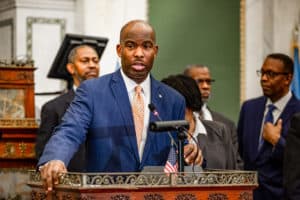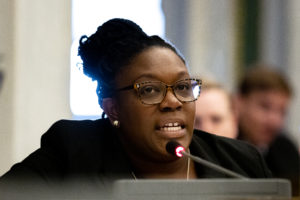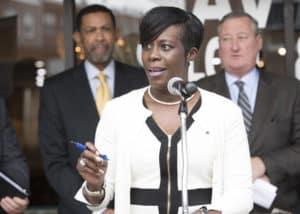COUNCILMEMBER GREEN PROPOSES MANDATORY ANNUAL APPROPRIATION TO CITY’S HOUSING TRUST FUND
 Councilmember Derek Green (At-Large) on Thursday introduced legislation (ordinance, resolution) to amend the City’s Home Rule Charter and call for a mandatory annual appropriation from the city budget to the Housing Trust Fund. The proposal is a Charter change requiring approval by two-thirds of Council and Philadelphia voters.
Councilmember Derek Green (At-Large) on Thursday introduced legislation (ordinance, resolution) to amend the City’s Home Rule Charter and call for a mandatory annual appropriation from the city budget to the Housing Trust Fund. The proposal is a Charter change requiring approval by two-thirds of Council and Philadelphia voters.
The Housing Trust Fund, the City’s main financial vehicle for addressing affordable housing needs, would receive an earmark of at least one half of one percent (0.5%) of the total amount of General Fund dollars for the same fiscal year, estimated to start at $26 million in the first year. During a recession or similar emergency, the Finance Director would be able to certify that need to allow Council to redirect the money to other purposes.
Councilmember Green issued a news release stating that as Philadelphia recovers from the COVID-19 pandemic and social unrest last year, and engages in conversations about systemic racism and finding different, innovative ways to fund city operations and produce more equity for citizens, the issue of affordable housing must be a significant part of that dialogue.
“Historically, the City has not done nearly enough to address the need for more livable, accessible, affordable housing for those most at risk of homelessness,” said Councilmember Green. “Far too frequently, I hear from members of the disability community about how difficult it is to find housing that is suitable and quite frankly, it’s an embarrassment. The Kenney administration must fulfill its promise to consistently provide more resources to the Housing Trust Fund. We must be bolder in our thinking and actions now that we are finally beginning to recover from the pandemic. We cannot afford to squander this opportunity to reset and create equitable systemic change for all Philadelphians, now and into the future.”
Green’s legislation is co-sponsored by eight members of Council and received support from the Women’s Community Revitalization Project.
COUNCILMEMBER GILMORE RICHARDSON OFFERS REFORMS TO CITY’S MINOR CURFEW LAW
Philadelphia’s Minor Curfew law would be reformed under legislation offered Thursday by Councilmember Katherine Gilmore Richardson (At Large). The proposed changes to the law include simplifying the curfew times to make them easier to understand, removing all punitive fines, and changing the requirements that young people must be taken to a police district. Councilmember Gilmore Richardson worked closely with the Office of Children and Families, the Department of Human Services, and the Philadelphia Police Department to reform curfew requirements and establish evening resource centers, safe spaces where minors who violate curfew can be taken to be connected to support services.
“Young people are being caught up in gun violence and other dangerous activity far too often, and we need to create systems to intervene and provide resources earlier,” said Councilmember Gilmore Richardson. “Reforming the curfew law by simplifying times, removing fines, and connecting young people and families to social services will help us keep kids safe and address the potential underlying challenges that often lead to young people being out late. My colleagues and I are looking at how young people get caught up in dangerous situations and working to reform the systems that lead to juvenile justice involvement or criminal activity.”
The legislation is co-sponsored by eight members of Council.
COUNCIL TO CONSIDER TWO BILLS OFFERING INCENTIVES TO GET PHILLY RESIDENTS VACCINATED AGAINST COVID-19
 Council has introduced two bills that would offer incentives to Philadelphia residents to get vaccinated against COVID-19, at a time when the pace of vaccinations citywide and nationally has slowed.
Council has introduced two bills that would offer incentives to Philadelphia residents to get vaccinated against COVID-19, at a time when the pace of vaccinations citywide and nationally has slowed.
As of May 24, 35.4 percent of city residents over the age of 10 have been fully vaccinated, or 670,344 people. Meanwhile, 46.7 percent of residents have received at least one dose of COVID-19 vaccine, or 880,057 people. President Biden has set a national goal of 70 percent of adults vaccinated with at least one vaccine dose by July 4.
The bills were introduced in Council Thursday by Councilmember Cindy Bass (8th District), who chairs Council’s Public Health & Human Services Committee, at Council President Darrell Clarke’s request. The bills would offer these incentives:
- Under one bill, city residents who get vaccinated would receive a voucher worth $50.00 redeemable as credit with the Philadelphia Gas Works or Water Department against their gas or water bills.
- Under another bill, residents who get vaccinated would receive a $50.00 gift certificate redeemable “in a manner to be determined by the City.”
Both bills require the Department of Public Health to set up a COVID-19 Vaccination Rebate Voucher Program to administer the rebates. The program would include a form by which residents would verify their residency and COVID-19 vaccination. No person could receive more than one voucher or gift certificate. The total number of vouchers or certificates would be capped at 100,000, meaning the programs would cost a maximum of $5 million. Council is working with the Kenney administration on the legislation.
“We need to act creatively and aggressively to get more Philadelphians vaccinated,” said Council President Darrell L. Clarke. “The simple reality is that a little less than 50 percent of Philadelphians have gotten at least one vaccine shot. That’s not enough, if we want to get our residents back to work, our schools re-opened safely, and our restaurants and other workplaces re-opened where people can feel safe around each other again.”
Even as Philadelphia seeks different ways to induce residents’ vaccinations, public health data reveals a disparity in the percentage of Black and brown residents getting the vaccine compared with the city’s white population. As of May 20, 48.5 percent of all vaccine doses in the city have gone to white residents, while 24.5 percent have gone to Black residents, and 8.9 percent to Hispanic residents. Asian residents have gotten 11.7 percent of the vaccinations.
Philadelphia’s population is 42 percent Black, 34 percent white, 14 percent Hispanic and 7 percent Asian, according to U.S. Census data.
“The disparity in vaccination rates shows again how the COVID-19 pandemic has disproportionately impacted our Black and brown population,” Clarke said. “We need to work together – City Council, the Mayor’s Office, the business community – to get Philadelphians vaccinated. It’s an all-hands-on-deck moment.”
COUNCILMEMBER PARKER INTRODUCES LEGISLATION TO INCREASE DIVERSITY IN CITY HIRING BY ELIMINATING ‘RULE OF TWO’
Majority Leader Cherelle L. Parker (9th District) introduced legislation (ordinance, resolution) that would increase diversity in municipal hiring by changing the City Charter to eliminate the so-called “Rule of Two.”
Under current law, when filling single-position vacancies for Civil Service jobs, only the two highest ranking candidates on the eligible list are submitted to the requesting department for an interview. The department then selects one of the two candidates to fill the position. That’s the Rule of Two.
The elimination of the Rule of Two will give the City more flexibility to address recruitment and diversity challenges and will have two major impacts on the City’s recruitment and selection process. Firstly, it will increase the diversity of candidate pools. Secondly, it will allow the City to leverage the use of alternate selection tools like training and experience as opposed to traditional “pen and paper” (a.k.a. standardized test) assessments.
“It is one thing for an employer to say, ‘Black Lives Matter,’ and an entirely different thing for an employer to make real, substantive changes that ensure diversity, equity, and inclusion,” Councilwoman Parker said. “Our municipal government is one of the largest employers in the City of Philadelphia, and for too long, the Rule of Two has held back Black and Brown employees, either from obtaining that entry-level job or from getting that promotion. This legislation is by no means a ‘silver bullet’ to making our City’s workforce, and particularly our City’s upper management, more reflective of Philadelphia’s demographics, but it is a necessary and important step.”
By eliminating the Rule of Two, Parker’s legislation allows the Human Resources Director for the City to set the rule for each announcement based on several variables defined under guidelines. The guidelines, to be set by regulation, will address:
• What is the diversity of the incumbents in the job title to be announced?
• Where are the gaps in diversity?
• What is the historical data from prior lists about diversity of the talent pool?
• Have the required key competencies and requirements on the job description been updated to attract the most qualified and diverse candidate pool?
Mayor Jim Kenney’s office supports the measure. “By expanding this rule, we will reach a wider and more diverse pool of candidates and create more flexibility in our hiring process,” said Stephanie Tipton, the Mayor’s Chief Administrative Officer.
Should the legislation pass Council by June 24th, it will go on the November 2021 ballot as a ballot question for city voters:
“Shall The Philadelphia Home Rule Charter be amended to revise provisions related to the civil service system, to allow the Personnel Director to determine the number of people on an eligible list from which a hiring or promotion decision may be made, and to determine the number of times a person may be passed over and remain eligible on such a list, all based on the position and the needs of the civil service program?”
SEEN ON SOCIAL MEDIA…
Anti-Gun Violence Resource Fair is happening on Saturday, June 5 from 12 noon to 3 pm at Carpenter Green Park, 17th and Carpenter Streets. My office is one of the sponsors of this event. 1/ pic.twitter.com/OxyKc9ZpDp
— Kenyatta Johnson (@CouncilmemberKJ) May 26, 2021
IN OTHER NEWS…
Citizens Police Oversight Commission bill approved by Council. Legislation establishing a new Citizens Police Oversight Commission, with subpoena power to investigate citizens’ complaints against police, passed Council overwhelmingly by a 16-1 vote.
The legislation was introduced by Councilmember Curtis Jones, Jr. (4th District), who chairs Council’s Public Safety Committee.
The Citizens Police Oversight Commission will replace an existing Police Advisory Board that has been in existence for a number of years, but has lacked subpoena powers or legal authority to more fully investigate complaints against police.
The new Oversight Commission will have authority to issue subpoenas to compel witness testimony or documents for investigations, retain their own Counsel, and make disciplinary and policy recommendations to the Police Department.
A selection panel will be formed to solicit applications from members of the public who are interested in serving on the commission. The legislation envisions an initial annual budget of approximately $1.9 Million. The bill now goes to the mayor.
 Council Urges General Assembly and Governor Wolf to Reject “Coerce to Work” Legislation. Council unanimously passed a resolution urging the General Assembly and Governor Wolf to reject House Bill 508, intended to end Pennsylvania’s participation in three federal pandemic unemployment benefit programs. Co-introduced by Councilmembers Kendra Brooks (At-Large) and Derek Green, the resolution calls attention to the potentially devastating impact that the “Coerce to Work” bill would have on Philadelphia’s communities hit the hardest by the pandemic, including Black and brown people, immigrants, caregivers, and poor and working-class residents.
Council Urges General Assembly and Governor Wolf to Reject “Coerce to Work” Legislation. Council unanimously passed a resolution urging the General Assembly and Governor Wolf to reject House Bill 508, intended to end Pennsylvania’s participation in three federal pandemic unemployment benefit programs. Co-introduced by Councilmembers Kendra Brooks (At-Large) and Derek Green, the resolution calls attention to the potentially devastating impact that the “Coerce to Work” bill would have on Philadelphia’s communities hit the hardest by the pandemic, including Black and brown people, immigrants, caregivers, and poor and working-class residents.
HB 508 would end Pennsylvania’s participation in the Federal Pandemic Unemployment Compensation (FPUC) program, which provides unemployed individuals an extra $300 per week in addition to state-provided unemployment compensation. Additionally, the legislation would end Pennsylvania’s participation in three other federal pandemic unemployment benefit programs: the Pandemic Unemployment Compensation Program, the Pandemic Unemployment Assistance Program, and the Pandemic Emergency Unemployment Compensation Program.
Eliminating the programs would adversely impact the financial stability of nontraditional workers such as gig workers, domestic workers, and self-run business owners, who are excluded from the traditional state unemployment program.
“The myth that unemployment benefits are to blame for perceived labor shortages is not only widely disputed by experts, it reinforces an anti-poor and anti-working class agenda championed by Republicans,” said Councilmember Brooks. “We need to work together to build a more just economy and society for all Pennsylvanians, to win a livable minimum wage and fair working conditions for everyone. Preemptively gutting benefits at this time is not only cruel, but will derail an equitable pandemic recovery.” The resolution is co-sponsored by nine Councilmembers.
OTHER SIGHTS AND SOUNDS FROM THE COUNCIL WEEK
Committee on Appropriations 5-21-2021
Committee on Public Health and Human Services 5-21-2021
FY2022 Budget Hearings – Departmental Callbacks 5-24-2021
Committee on Streets and Services 5-25-2021
FY2022 Budget Hearings – Departmental Callbacks 5-26-2021
FY2022 Budget Hearings – Public Testimony 5-26-2021
Stated Meeting of Philadelphia City Council 5-27-2021
PHILADELPHIA FACTS AND FIGURES
The next Stated Meeting of City Council is scheduled to take place on Thursday, June 10, 2021 at 10 a.m. The Meeting will be held remotely due to the ongoing pandemic, and will air on Xfinity Ch. 64, Fios Channel 40 and stream at www.PHLCouncil.com/watch.
Featured Photo: Rob Rabena for Visit Philly





